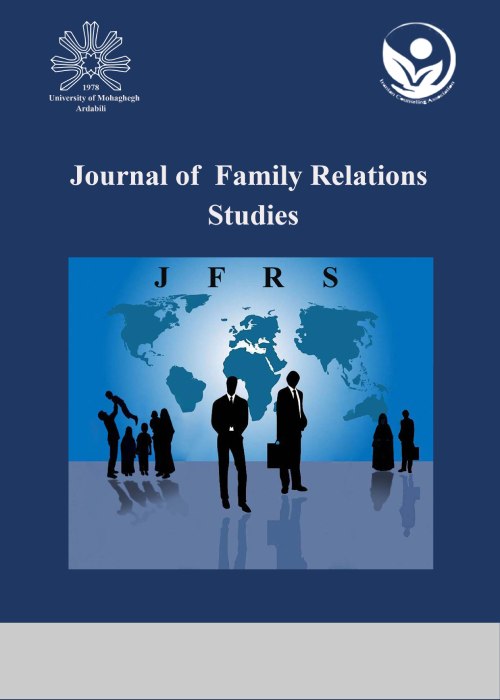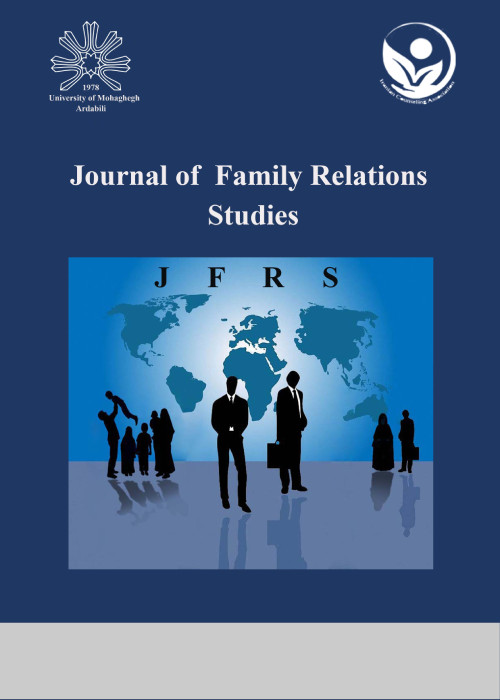فهرست مطالب

Journal of Family Relations Studies
Volume:3 Issue: 11, Oct 2023
- تاریخ انتشار: 1402/07/09
- تعداد عناوین: 6
-
-
Pages 4-12Objective
This study aimed to investigate the effectiveness of forgiveness therapy on the mental health and marital intimacy of couples seeking divorce in Tehran.
MethodsThe quasi experimental design was pretest-posttest with a control group. The study's statistical population included all divorce applicants in districts 2 and 5 of Tehran who had been referred to counseling centers for counseling services. By convenience sampling, thirty people were selected from the above population and randomly assigned into two experimental (n=15) and control (n=15) groups. The research instruments were Goldberg Mental Health Questionnaire (GHQ) and Thompson & Walker Marital Intimacy Questionnaire. Data were analyzed using the covariance test.
ResultsBased on the results of the research on the effectiveness of forgiveness therapy on the mental health, the difference between the experimental and control groups in terms of the amount of mental health in the post-test was confirmed. The research on the effectiveness of forgiveness therapy on marital intimacy was investigated, and the difference between experimental and control groups was confirmed.
ConclusionAccording to the results of this study, it can be said that forgiveness therapy has increased mental health and marital intimacy in people under education.
Keywords: Forgiveness therapy, mental health, marital intimacy, divorce -
Pages 13-21Objective
The aim of this study was to compare physical health and family functioning in patients with obsessive-compulsive disorder, bipolar disorder and normal.
MethodThe present study is a causal-comparative study and the statistical population of the study includes all obsessive-compulsive and bipolar patients hospitalized and referred to Fatemi Hospital and psychiatric clinics in Ardabil in autumn, which were received by obsessive-compulsive and bipolar disorders. . From this statistical population, 40 obsessive-compulsive individuals, 40 bipolar individuals and 40 normal individuals were selected by available sampling method and answered the physical health and family functioning questionnaires. Data were analyzed using SPSS-25 software.
ResultsThe results of the present study showed that there is a significant difference between physical health and its components in patients with obsessive-compulsive disorder, bipolar disorder and normal (P <0.01). Also, this difference is significant in the family performance variable and its components in all three groups of normal, bipolar and obsessive (P <0.01).
ConclusionThese results indicate that impaired family dysfunction and physical health increase the severity of obsessive-compulsive disorder and bipolar disorder. Therefore, paying attention to this result in psychotherapy plans and specialized interventions can be effective.
Keywords: Physical Health, Family function, Obsessive Compulsive Disorder, Bipolar disorder -
Pages 22-30Objective
The aim of this study was to investigate the relationship between perceived Islamic parenting and the desire to get married mediated by spiritual well-being in single students of Ferdowsi University of Mashhad.
MethodsThe research method was descriptive and Structural Equation Modeling (SEM). This study's statistical population included single students of Ferdowsi University of Mashhad who were studying in 2021, among which 400 students were selected through purposeful sampling and completed these questionnaires: Islamic Parenting Questionnaire of Maktobian Bharanchi et al., (2015), Spiritual Well-being Questionnaire of Golparvar et al., (2015), and the student version of desire to get married questionnaire of Heydari, et al., (2004). Structural Equation Modeling was used to analyze the data.
ResultsThe Pearson correlation results showed a positive and significant correlation between perceived Islamic parenting and spiritual well-being with the desire to get married (p<0.05). In addition, results showed that perceived Islamic parenting could predict the desire to get married both directly and through spiritual well-being and were significant (p<0.001).
ConclusionAccording to the research findings, perceived Islamic parenting and spiritual well-being are the variables affecting the desire to get married in single students.
Keywords: Desire to get married, spiritual well-being, Single Student, Perceived Islamic Parenting, Single Students -
Pages 31-40Objective
The present study aimed to investigating the effectiveness of schema-based parenting training on mothers' parenting self-efficacy,self-concept and parental acceptance of children with internalizing disorders.
MethodsThe research was semi-experimental (pre-test,post-test and follow-up design with control group).The statistical population was primary school children and their mothers in Tehran. The statistical sample includes30mothers and children with internalizing problems who went to counseling centers and after being diagnosed based on Achenbach's checklist,they were selected by available sampling and randomly assigned to two experimental groups(15people)and the control group(15people)was replaced. To collect information,children's self-concept scale(CSCS),Parental Acceptance-Rejection Questionnaire(mother form)and parental self-efficacy questionnaire were used.
ResultsThe findings showed that, compared to the control group,the educational approach has been effective in improving the self-efficacy of mothers' parenting,self-concept and parental acceptance of children at a significant level during the assessment stages and in the interaction between the stages with the experimental group,to improve the self-efficacy of mothers' parenting,self-concept and parental acceptance Children with internalized problems can use the schema-based parenting education approach(p<0.05).
ConclusionThe findings showed that the schema-based parenting education approach has been effective in improving mothers' parenting self-efficacy,self-concept and children's parental acceptance during the assessment stages and in the interaction between the stages with the experimental group.
Keywords: Schema-based parenting education, mothers' parenting self-efficacy, self-concept, parental acceptance, internalized disorders -
Pages 41-47Objective
The purpose of this paper was to examine the effectiveness of the training couple care program (CARE) based on Halford’s instructions on intimacy and trust of couples referred to counseling centers of Isfahan in 2021.
MethodsThe research methodology of this study was semi-experimental divided into two groups of experiment and control with 16 participants in each group. The statistical population of this research included all couples who have referred to the counseling centers of Isfahan in the first 6 months of 2021. Subjects of experimental group participated in 7 sessions of the training program which each session took 90 minutes. Research data was collected by Alavi’s questionnaire. For evaluating of the content validity of this questionnaire was utilized experts’ propositions. Findings showed that the training approaches of the couple care program (CARE) are effectiveness on the intimacy, emotional, supportive, and aggressive behaviors, and trust of couples.
Resultswhen the emotional experience of love and intimacy in couples’ relationships becomes less important and less valuable, the life atmosphere definitely becomes unstable and unreliable. Therefore, by implementing the care training program, it is possible to create a calm psychological atmosphere in couples’ relationships and provide the way for a more productive conversation. In this way, intimate relationships become stable with the ability to communicate and agree on interests in a relationship.
Conclusionthe beliefs and expectations of couples affect the perception of couples, marital life, relationships and interactions. So that they can form stable relationships between couples or lead intense love to divorce; which can be improved with the help of rich programs such as CARE couple care program, communication, and care in couples.
Keywords: Couple Care Program emotional behaviors, intimacy, supportive behaviors, Aggressive Behaviors, Trust -
Pages 48-57Objective
The present study was conducted to explain the lived experience of patient’s families with Covid-19 that admitted to the hospital.
MethodsThe present qualitative study was based on a hermeneutic phenomenological approach. The population included the patient’s families with Covid-19 admitted to the Imam Khomeini Hospital in Tehran during 2021-2022. After the initial investigation, 16 patient’s family’s members were selected through purposive sampling method. Data collection was done through in‐depth, semi-structured interviews. The data were analyzed following the method proposed by Diekelman et al. As for data management, Software MAXQDA version 10 was used.
ResultsThirteen participants were female and 3 were male with a mean age of 31 years. The five main themes along with their sub themes were identified: “in the turbulent of the disease”, “emotional fluctuation”, “living with perception of loneliness”, “a flash of hope” and “in search of compatibility”.
ConclusionThe families of patients with Covid-19 admitted to the hospital appear to be experiencing a number of challenges. Nurse and treatment team can provide support for patient’s family and also, they can play an effective role in preventing adverse complications.
Keywords: COVID-19, family, Patient, phenomenology, Qualitative Research


